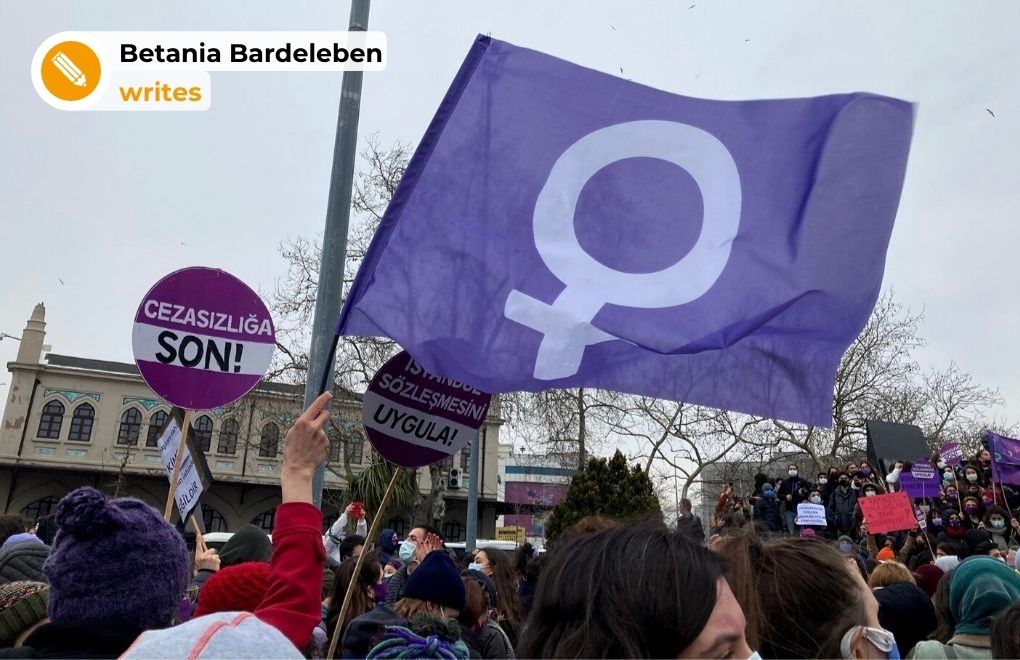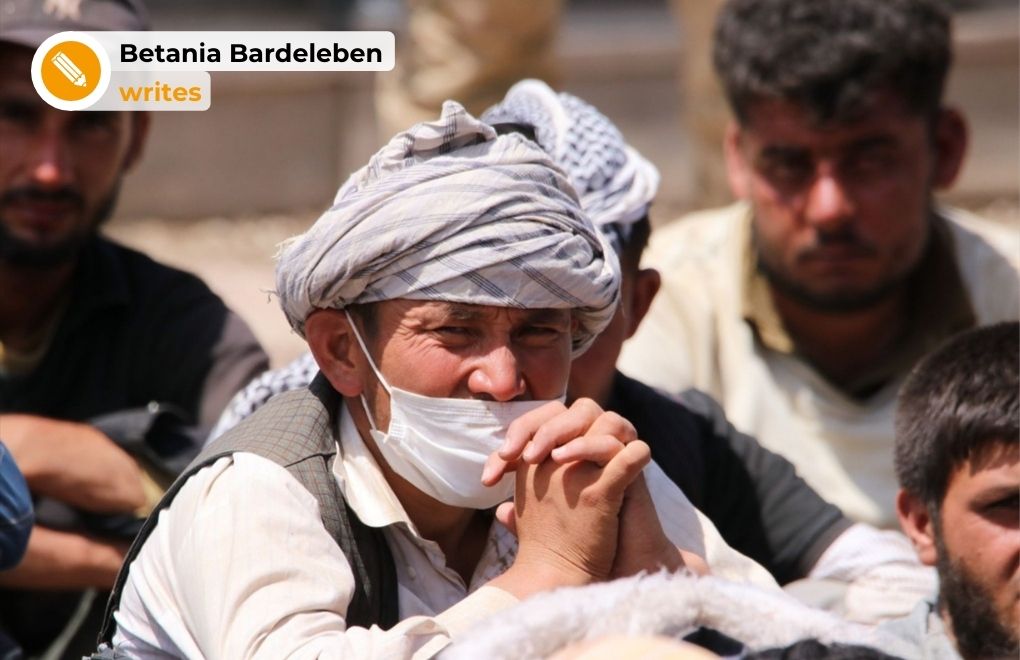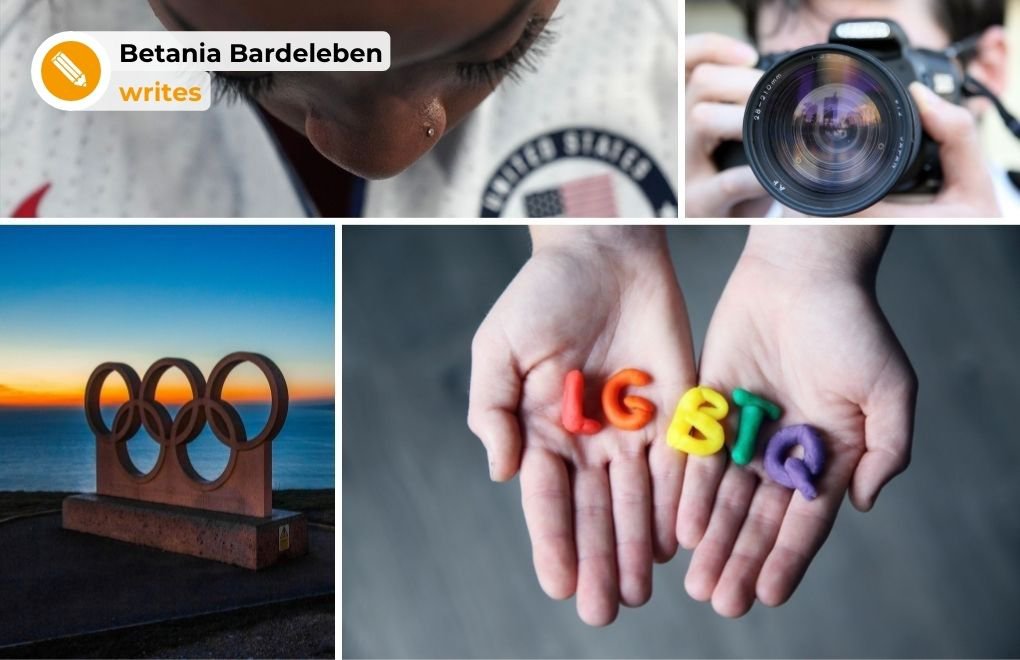Beauty and the East – Yabancı* observations about the freedoms of women in Turkey

* Photo: Dilek Şen / bianet
That the disadvantages women face in Turkey originating from long-held traditions are in-sync with structural inequalities was once again thrown in my face during the weekend pandemic bans when I heard that the supermarket next to our house was not selling tampons.
The owner had independently decided that hygienic products for women would not count as a "primary need" and, thus, would not be sold.
I think feminist talk is cheap. For me as a European citizen, it is maybe as cheap as the Turkish Lira.
But rather than condemning the society of Turkey for these existing grievances of women in the country, I simply want to share some yabancı* (foreigner in Turkish) observations and experiences that have opened up questions about other life realities and mindsets. Upsetting situations that I found confusing and somehow couldn't file in my head...
There is not one Turkey, but multiple
Trends are not one-sided. Not all youth decide to swap a Hijab for crop tops these days, also not in the metropolitan city of İstanbul - The directions of changes are determined by the closer environment.
Traveling in Turkey has clearly shown me that there is not only one Turkey but multiple. Regarding the life standards of citizens of Turkey, for example the minimum wage which sits at the starvation level, Turkey counts as a developing country. When the differences among the people are wider, the life realities also differ.
But especially since the democratic backsliding and the recent withdrawal from the İstanbul Convention by a Presidential decision, the overall violence against women is ever-increasing. The deficient legal framework to police violence has given sexist and traditionalist views more ground and confidence to permit unjust behavior against women.
I love Turkey, and even Ankara. After finishing my studies in Vienna, Austria, I moved to Ankara in the beginning of 2021 to begin my master's in social sciences. Despite the fact of a hostile living environment for women in the country, I spent most of my time in Turkey in safe living conditions as a student of the Middle East Technical University (METU).
Therefore, apart from the tiring officials needing to display their power as frequently as possible, I rarely experienced any unjust treatment or sexist behavior. On the contrary, my bubble of friends and colleagues, both men and women, seemed to be particularly conscious of their words and actions.
These first impressions might have given me the confidence to start hitchhiking alone during the semester break.
Despite my poor and fragmented knowledge of Turkish, I had a great time hitchhiking from the Black Sea region (I had been warned about conservative attitudes in that area) towards Kars in eastern Turkey.
Neither on the road nor while couch surfing did I experience anything untoward. Though, without exception, the people (all male) I was riding with confirmed with me the actual dangers about solo travel as a woman.
They consistently tried to convince me to continue my journey with the bus instead of putting myself in danger on the road.
Somehow these men felt as if they took responsibility for me when they picked me up on the road. They must have perceived me as ignorant and stubborn to reject their offers to spend the night at their homes and I am aware that this might not have been unjustified.
It was only while I was continuing to hitchhike together with my boyfriend in eastern Turkey that we accepted a spontaneous offer of our ride to spend the night at their farm, where the whole family welcomed us.
It was the first time that I saw such a traditional rural Kurdish household. The grandmother cooked dinner for everyone alone and the grandfather was sitting in the most comfortable spot in the living room.
Everyone seemed to be so fine and content in exercising his or her daily lives according to the traditional gender roles.
Like a hair in the sink
Although I was repeatedly stunned by the kindness of citizens in Turkey, especially in the poorest regions, I often do not understand the way I am treated.
Visiting an old bakery in the outskirts of Trabzon, I was refused to pay for my tea and the additional meal I had received without ordering it.
The few people in the bakery (all men) gave me food and comfort, but preferred to further ignore me. They did not even look at me and only seemed annoyed by my efforts to communicate with them.
Naturally I asked myself questions such as: Maybe they do not want me here, maybe they act out of Muslim piety, or they just want to seem generous in front of their friends and guests? But actually, my presence bothers them and is perceived as unnatural.
Also, on the bus, older men ignored me when I tried to talk to them in broken Turkish. It might have been the language barrier, but instead of trying to communicate, many men act as if I was not worthy to make an effort and rather treat me as if I was invisible.
The power displays I experience in small gestures in my daily life here keep confusing me. Why is this necessary? Why does it happen? While I rarely felt this way in Europe, I exhibit this exact feeling of being inappropriate frequently in Turkey after moving outside of my natural environment as a woman, like a hair in the sink or chewing gum under a sole.
This feeling is reasonable. As a social and cultural anthropologist, I am reminded of the concept of 'matter out of place.' By that, the British Anthropologist Mary Douglas implied the existence of a strong social system and an organization of the world.
It is not hot news that gender roles in Turkey are more rigid than the ones in Germany or Austria. Still, the gender-specific classifications of spheres of work and action and the direct connection to status, power, religion and worldview is incredibly visible and omnipresent in daily life in Turkey. Even more so after the withdrawal from the İstanbul Convention...
After moving to İstanbul, eventually exiting my student bubble in Ankara for good, I have realized that men on the street look at you more blatantly.
The men here are less ashamed, and I feel treated with less respect. I find it very likely that many of the men adopt judging through staring as if it was their birthright, or even an obligation. If I am not being looked at, who could tell me that I am not behaving correctly?
I am sure this does not happen very consciously, but the stares are meant to unsettle women, serving as a daily reminder that men are the ones that make the rules and are thus the ones to ensure they are being followed.
Blending of the personal and the political
The personal is always political - this is also a reality in Western Europe, but here, the structural inequalities blend in unbridled. Gender hierarchies are so obvious and unhidden that it becomes much more apparent in the personal realm.
A friend from Turkey working as a human rights lawyer in İstanbul faces daily hardships of attaining success as a woman in her professional space.
Her perception is that in order to be heard and respected, you, as a woman, have no choice but to act bluntly and mercilessly – effectively leaving her with the choice to be respected or liked.
The picture of a modest but independent successful woman seems hard to reconcile in the traditional views held by most in society here.
Interestingly, several times I observed how young women complained in public spaces when men were not following rules in public, like when men were not wearing face masks in the right way. Every time, it was a young woman firmly referring to the public rules to secure order.
This was quite stunning to me, as in Germany/Austria, it is typically either the elderly women or mothers with children that complain about improper behavior in public spaces. It seems as if only the status of being a mother or of advanced age gives these women the right to complain or just makes them care less about how they appear. Because such little complaints are rather perceived as meticulous in the countries I lived in. Younger people are rather unconcerned with attracting this attention, often perceived as negative.
I explained this with the assumption that the defining lines between the personal and the public space are less clear in the sense that the interest of the complaining woman is coherent with the interests of the remaining public.
As women are legally at a disadvantage in Turkey, it could also be the case that they feel the need to refer to their legal rights as citizens even more. Most likely, the frustration about men acting careless about their environment on a daily basis has made women impatient and they do not see a reason to remain quiet and permit stupidity.
Occasionally, people here drop assumptions about natural differences between men and women. They sound to me like fairytales that I would not think people still believe.
In Turkey, I sense the prevalence of this mental connection that men and women behave like culture to nature. (That a strict distinction can be drawn.) I think that rather this relational perception of a strict distinction is important and not whether women are nature or culture in this distinction.
This anthropological argument tries to bridge cultural understandings and explain universal similarities in cultural particularities in relation.
Very often, social-structural arrangements exclude women from participation in the realm in which the highest powers of the society act. For traditionalists, the reasoning is obvious: They want to preserve the traditional values with its rigid gender roles and the inferior position of the woman.
But the nature/culture argumentation also makes sense in the secular Turkish tradition: By cooking food, raw ingredients become digestible. This is another perspective from which women can be seen as in charge of culture. The connection to the Republic of Turkey: Women obtained the right to vote in 1934, 37 years before Switzerland and 10 years before France, while gender equality was proclaimed and polygamy was forbidden in 1926.
While a change in the mindset about equality is debatable, women could now get used to the habit of referring to their legal rights much earlier than in some Western European countries.
So, using this metaphor, while in the secular bloc, the women is rather in parallel with the culture, on the Muslim side, it is in parallel with nature. It is inferior to the men because the latter has the freedom to transcend these realms, while women are immobile.
This was just a thought of mine as I tried to make sense out of different traditions within Turkey, but a similar inferior treatment of the women.
Beauty and the East
My impression of women in Turkey is that they ARE indeed very beautiful. At least through measures of 'norm-beauty', which entails a neat and thought-through appearance. There are reasons for that.
Remaining with the nature concept, younger women in society in Turkey are forced to oppress the natural in order to be taken seriously.
I frequently heard from female friends that they feel the pressure to "prepare for society" when they leave the house. They do not have the freedom to transcend nature and culture in public like men do, instead having to stick to their roles to remain authentic and be judged less.
What authenticity means is again dependent on the ideology of the environment and becomes very apparent in the beauty standards of women in Turkey. I was told that among the youth, there are two trends: Either you look pretty regarding modern Western standards, or in a traditional - if not to say "orientalist" way, wearing a veil in a balanced and moderate way.
Two friends told me that they dyed their hair once in their life – when they were on Erasmus in Germany, where there was more ease in risking conventional Turkish beauty for a look driven more by individual desires.
Many women in Turkey also choose to disregard the rules in Turkey and show up as they like. The emphasis here is on "choose", because - more nuanced than in the countries I lived in - they consciously decide to attract stares. This emancipated feminist decision demonstrates well how being a feminist is a natural reaction to your environment.
Collective action (?)
That is brave because people know the risks. In social media channels like Twitter, which is much more popular among my generation in Turkey than in Germany or Austria, one can read daily posts about men thanking President Recep Tayyip Erdoğan for making the charges of violence against women lesser by withdrawing from the İstanbul Convention.
Being aware of such a hostile environment makes it hard to not become more sensitive against potential threats.
A few weeks ago in Ankara, it turned out that a friend of mine was regularly beating his girlfriend. This issue was discussed in a student-run woman's solidarity network, which included a part of his social circle.
Because it was clear to them that he would not be judged before court, it was collectively decided to socially punish him by breaking off contact with him.
By being told about his misdemeanors and this decision, I was somehow becoming part of a collective punishment beyond individual revenge. What seems unimaginable for me to happen in an Austrian university in that way, is a consequence of the perverted justice system in Turkey.
Because of this environment, the bonds among the community are strong, supportive and inclusive. The rainbow colors stand for LGBTQ, but in Turkey even so for fairness, solidarity and conscientiousness.
No one is there to represent them, which makes the fusion of the active communities especially important. Together they build the one political bloc on which most people's hope for Turkey's democratic future rests.
In contrast to Western Europe, where groups are most commonly supported by the state or non-governmental organizations, women's activism in Turkey feels like doing something illegal. Meanwhile, the increasing violence against women and minorities is being tolerated.
Answering my question about how it feels to be a woman in Turkey, my queer friend told me that it feels overwhelming at times. There are moments when she does not want to be identified as a woman because it is more burdensome. For Turkey, she does not have much hope for positive change. Nevertheless, she participates in all demonstrations and is politically active, because, as she explains, it is necessary.
A few days ago, another queer non-binary friend said that they was feeling more comfortable being politically active in Turkey than abroad, because in Turkey, there is not a fear of deportation back to Turkey, so they would feel free to be taken into custody at demonstrations wherever and whenever they liked. I guess this logic behind their feeling of freedom makes sense. Freedom really is a state of mind.
About Betania Bardeleben ReynaJuly 2021 intern at bianet English. Social and cultural anthropologist and journalist from Germany. Currently enrolled in a German-Turkish Master's Program in Berlin and Ankara. Living in İstanbul. Especially interested in power structures, subcultures and rights of women, refugees and minorities. Regional focus: Middle East and North Africa (MENA), Turkey, Mexico. |
(BB/SD)







